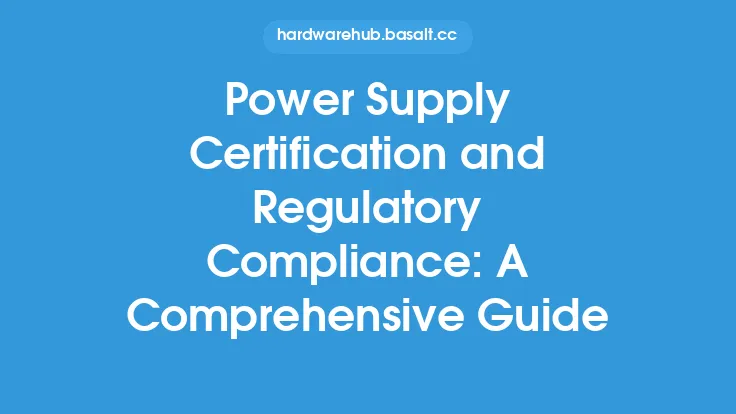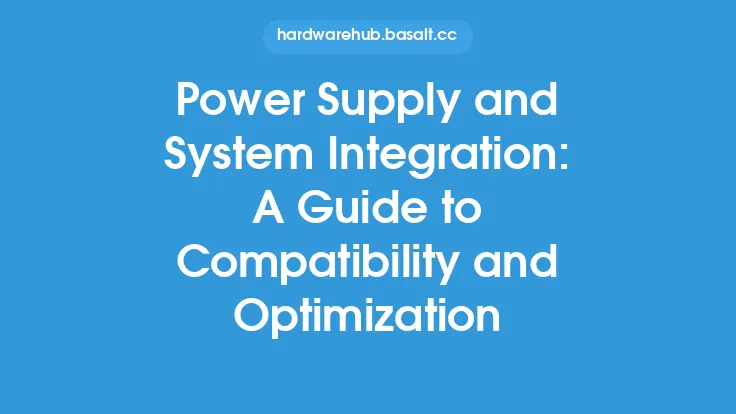When it comes to power supplies, certification is a critical aspect that ensures the safety and reliability of these components. Power supply certification is a process that verifies a power supply's compliance with various safety and performance standards. These standards are set by reputable organizations, such as UL (Underwriters Laboratories), ETL (Intertek), and TUV (Technischer Überwachungsverein), among others. In this article, we will delve into the world of power supply certification, exploring the different types of certifications, the testing procedures, and the benefits of certified power supplies.
Types of Power Supply Certifications
There are several types of power supply certifications, each with its own set of requirements and testing procedures. Some of the most common certifications include:
- UL (Underwriters Laboratories) certification: This is one of the most widely recognized certifications in the industry. UL certification ensures that a power supply meets the safety standards set by UL, which includes testing for electrical shock, fire, and other hazards.
- ETL (Intertek) certification: ETL certification is similar to UL certification, but it is issued by Intertek, a different testing and certification organization. ETL certification also ensures that a power supply meets the safety standards set by the organization.
- TUV (Technischer Überwachungsverein) certification: TUV certification is a European certification that ensures a power supply meets the safety standards set by the European Union.
- CE (Conformité Européene) certification: CE certification is a European certification that ensures a power supply meets the safety, health, and environmental protection standards set by the European Union.
- FCC (Federal Communications Commission) certification: FCC certification is a US certification that ensures a power supply meets the electromagnetic compatibility (EMC) standards set by the FCC.
- 80 Plus certification: This certification is specific to power supplies and ensures that they meet certain efficiency standards. 80 Plus certification is awarded to power supplies that achieve a certain level of efficiency, such as 80 Plus Bronze, Silver, Gold, Platinum, or Titanium.
Testing Procedures
The testing procedures for power supply certification involve a series of tests that verify a power supply's safety and performance. These tests include:
- Electrical shock testing: This test ensures that a power supply does not pose an electrical shock hazard to users.
- Fire testing: This test ensures that a power supply does not pose a fire hazard.
- EMC testing: This test ensures that a power supply does not emit electromagnetic interference (EMI) that can interfere with other devices.
- Efficiency testing: This test ensures that a power supply meets certain efficiency standards, such as those set by 80 Plus certification.
- Reliability testing: This test ensures that a power supply can operate reliably over a certain period of time.
- Environmental testing: This test ensures that a power supply can operate in different environmental conditions, such as high temperatures, humidity, and vibration.
Benefits of Certified Power Supplies
Certified power supplies offer several benefits, including:
- Safety: Certified power supplies ensure that users are protected from electrical shock, fire, and other hazards.
- Reliability: Certified power supplies are designed to operate reliably over a certain period of time, reducing the risk of downtime and data loss.
- Efficiency: Certified power supplies, such as those with 80 Plus certification, ensure that users can save energy and reduce their environmental impact.
- Compliance: Certified power supplies ensure that users comply with regulatory requirements, reducing the risk of fines and penalties.
- Peace of mind: Certified power supplies give users peace of mind, knowing that their power supply has been tested and certified to meet certain safety and performance standards.
Choosing a Certified Power Supply
When choosing a certified power supply, users should look for the following:
- Certification marks: Look for certification marks, such as the UL or ETL mark, on the power supply or its packaging.
- Certification documents: Request certification documents, such as test reports or certificates, from the manufacturer or supplier.
- Manufacturer reputation: Choose a power supply from a reputable manufacturer that has a track record of producing high-quality, certified power supplies.
- Warranty and support: Choose a power supply with a good warranty and support, in case users need to replace or repair the power supply.
Conclusion
In conclusion, power supply certification is a critical aspect of ensuring the safety and reliability of power supplies. By understanding the different types of certifications, testing procedures, and benefits of certified power supplies, users can make informed decisions when choosing a power supply. Whether users are looking for a power supply for a desktop computer, server, or data center, certified power supplies offer peace of mind, safety, and reliability. By choosing a certified power supply, users can ensure that their power supply meets certain safety and performance standards, reducing the risk of downtime, data loss, and electrical shock.





